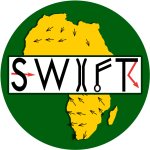The African SWIFT Legacy Seminars featured a series of six online seminars for both external and internal audiences. The seminars provided a forum for discussing not only SWIFT’s achievements from 2017 to 2022, but also the future of weather forecasting in Africa. Please find the presentations below, or take a look at the Legacy Seminars playlist.
Improving nowcasting and synoptic forecasting of extreme weather across Africa
John Marsham (UoL), Maureen Abla Ahiataku (GMet), Alex Roberts (UoL), and Estelle de Coning (WMO)
In light of strong convective storms frequently affecting lives and livelihoods across Africa, there is a great demand to improve predictions of high-impact weather. In this seminar, we will explore how African SWIFT has supported scientific advances and research operations in nowcasting and synoptic forecasting.
Seminar recording
Developing sub-seasonal forecasting techniques to improve climate resilience across Africa
Linda Hirons (NCAS-Reading), Masilin Gudoshava (ICPAC), Chiekh Dione (ACMAD) and Steve Woolnough (NCAS-Reading)
Sub-seasonal forecasts have a huge potential to aid preparedness and disaster risk reduction in a variety of sectors. In this seminar, we will illustrate how African SWIFT has encouraged the uptake of sub-seasonal forecasts by multiple users and further advanced our understanding of sub-seasonal drivers.
Seminar recording
Bridging the gap between African meteorological research and operations
Ben Lamptey (GMet), Coumba Niang (UCAD), Bashiru Yahaya (GMet)
Ensuring a strong collaborative partnership between African national meteorological services and academic institutions, has been a core principle throughout the African SWIFT project. In this seminar we highlight the benefits of an improved link between African meteorological research and operations and ask how strong partnerships can continue into the future?
Seminar recording
Presentation slides
Ensuring sustainability of African meteorological research and solutions
Elijah Adefisan (ACMAD), Andre Foamouhoue (ACMAD), Joseph Mutemi (UoN), Helen Ticehurst (UKMO/WISER)
Advances achieved in projects need to be embedded into sustainable improvements in Africa if they are to have a legacy. What are the key requirements and pathways for new research and operational activities to achieve a sustainable footing? Capacity-building, training, standard operating procedures, and sustainable income, backed up by sound impact-based evaluation of the value of forecasts, are all parts of the solution.
Seminar recording
Presentation slides
The future of African weather forecasting: The way forward and its sustainability for socio-economic development?
Doug Parker (NCAS), Ben Lamptey (GMet), Emma Visman (UKCEH). Mariane Diop-Kane (WMO)
Over the next several decades we will see a revolution in African weather forecasting. Improved, sustainable services are within our reach if we take the necessary steps. In this seminar we ask what steps need to be taken by the international community, to create an effective and sustainable “value chain” which includes the creation of forecast products to the improvement of weather-based decisions.
Seminar recording
The future of African weather forecasting: What are the priorities for international funding to build capability and capacity?
Lorraine Youds (WMO), Doug Parker (NCAS), Ousmane Ndiaye (ANACIM), Katherine Marsden (FCDO, UKMO)
The international community has committed billions of dollars of investment to improve climate resilience in the Global South, and some of this will need to be invested in the improvement of weather prediction. The UK’s CLARE programme, and WISER are examples of funding streams which may be able to address this challenge. In this seminar we discuss what the priorities are for investment in African weather prediction, and how best should the resources be deployed? How can project funding be combined with operational funds and private sector contributions to achieve sustainable outcomes?
